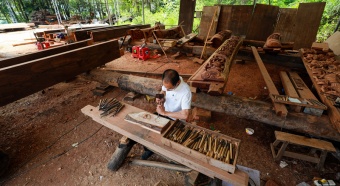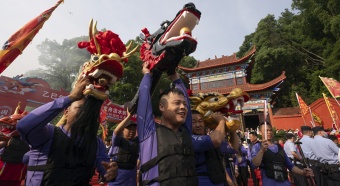Chinese and British national flags are seen at the Horse Guards Parade in London, Britain, Oct. 17, 2015. [Photo: Xinhua/Han Yan]
The topic of education exchange tends to sound dull, but that banal impression is definitely not applicable in terms of Sino-UK education exchange, especially at a time when Chinese President Xi Jinping is in the United Kingdom for a state visit.
In fact, bilateral education exchange is not only dynamic, but also controversial from allegedly money-oriented college-enrolment programs in the UK aimed at well-to-do Chinese students to the experiment of introducing strict Chinese-style teaching methods into UK schools.
Anyway, the UK has now become a top destination for Chinese students wishing to study overseas. The number of Chinese students in the country had hit 150 thousand by the end of 2014. China's Minister of Education Yuan Guiren said in an interview that education exchange has now entered a rapid period of development.
"In the first place, the number of students from both countries has expanded. In 2014, 65 thousand Chinese students went to the UK, and currently, the number is 150 thousand, the highest among European countries. Meanwhile, six thousand British students came to China. The increase was an obvious one," Yuan said.
Both Chinese and British governments have initiated a series of measures to promote education exchange. On China's side, the government has increased the number of full scholarships year by year. It announced in 2014 that ten thousand government-funded students will study in the UK in the following five years. China also financed more than two hundred British students to study in China. The British government says it will send 80 thousand of its students to study or intern in China.
Earlier this year, a controversial British government experiment introducing Chinese-style maths lessons in English schools looks set to expand after being hailed by Schools minister Nick Gibb as one of the most successful things the Department for Education has done.
Nick Gibb, who is hoping to fly out to Shanghai in February to learn more about Chinese teaching methods, has described the results of the pioneering experiment as incredible, with less-able children faring particularly well.
Groups of primary and secondary school teachers from a selection of English schools have even traveled to Shanghai to watch Chinese teachers in action.
"When that's brought to England and the approach has been tried in English schools, it's been hugely successful," said Gibb. "Teachers have been pleasantly surprised by how much some of the less-able children are achieving in maths as a consequence of this approach."
Media reports say that thirty Chinese teachers have been flown to the UK to demonstrate their technique in English primary school classrooms.
The minister described seeing a Chinese teacher in a Harris academy devote an entire lesson to how to multiply two double digit figures ending in zero. "I walked around the classroom and all the children were understanding what was happening and could perform the calculation," he said.
In an interview with the Guardian, Gibb called for learning from "the best in the world", in particular Shanghai, which scores top in maths in the international PISA tests.
PISA refers to OECD's Programme for International Student Assessment that "evaluates" education systems worldwide by testing 15-year-olds in key subjects. In 2012, Shanghai ranked first in Maths, Reading and Science, ahead of Singapore and Hong Kong China.
The minister's comments about Chinese teaching came the day after the BBC showed the second of its TV series Are Our Kids Tough Enough? Chinese School which has shown Chinese teachers struggling to control English children, and UK teachers less than complimentary about Chinese methods.
Early research into the effectiveness of the Shanghai mastery approach in an English context indicates a small improvement in children's maths performance, but experts say it needs to be tested over a longer period in a greater number of schools to build a more complete picture, and it has many critics inside the world of education and outside.
The three-part documentary series about the style of Chinese teaching and how it works for young British students is designed to see whether the Chinese education system can have positive academic results for British students.
Five high-end Chinese teachers were invited to spend four weeks at a comprehensive school in Hampshire and take over the education of 50 teenagers.
According to the BBC, for the entire process, teenagers wore special uniforms and started the school day at 07:00. Lessons were focused on note-taking and repetition as well as some group exercises. In addition, students were also required to clean their own classrooms and take only two meal breaks in their 12-hour day.
In tests at the end of the period, the students studying with the Chinese method achieved marks approximately 10 percent higher in math and science compared with the rest of their group, who continued to be taught by their regular teachers in the English manner.
Many Chinese netizens commented on Sina Weibo that China's basic education is strong and has improved in recent years.
"Now the Chinese approach to education is not confined to strict and absolute obedience, because teachers also encourage different student's potential," said Zhang Qi, a Chinese student who has studied in China and Britain.
"China has been learning from the West through various reforms, and now a majority of its well-funded schools are adopting their ideas," said Sun Jin, an associate professor of international and comparative education at Beijing Normal University.
While some British viewers said that the Chinese school doubled the time spent in class for only a 10 percent increase in results, many British also said that the discipline and some of the Chinese methods were present in the British education system decades ago.
"That's not the 'traditional Chinese method', it's the 'traditional method', period. It's how I learned decades ago, and guess what? It worked. 'Discovery learning' or whatever you want to call it, hasn't reinvented the wheel, it's banned from the classroom," one netizen named Alfred Greengrass wrote in an online debate, which won him 1,198 "likes".
"The UK needs to promote the authority of teachers to make teaching more efficient and better exploit the potential of teachers," China Daily quotes Sun as saying, adding that China can also learn from the UK.
In addition, the UK's interest in China's primary and secondary education has even extended to a display of symbols including Chinese school uniform collection.
Earlier this year, The Victoria and Albert Museum in London, added a Chinese high school uniform to its permanent collection. A note beside the collection writes the uniform is 'the standard school uniform by every secondary school student in Shenzhen.' The note describes the uniform as both practical and comfortable and many students would continue to wear it after they leave school. The school uniform has become a symbol of Chinese popular culture, featured in comics and cartoons, the note concludes.
In September, visiting Chinese Vice Premier Liu Yandong told the closing ceremony of the 5th China-Britain Young Leaders Roundtable in London that said Chinese and British youth should learn from each other and carry on the friendship between the two countries. Young people are the most dynamic and creative group, Liu said, noting that youth combined with innovation can bring their capabilities to full play.









